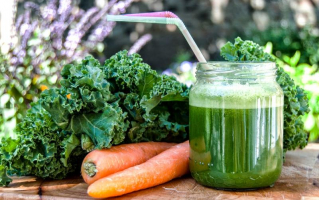Top 7 Health Benefits of Eucalyptus Leaves
Eucalyptus is an evergreen tree known for its therapeutic benefits. Although originally from Australia, this famous tree is now found all over the world. It ... read more...has a gum-infused bark, tall stems, and round leaves that, if eaten whole, are difficult to digest. However, eucalyptus leaves may be turned into a safe-to-drink tea. The leaves can also be turned into essential oil for topical or inhalation applications. Here are the most astounding eucalyptus leaf advantages.
-
Although fresh, entire eucalyptus leaves cannot be eaten, dried leaves can be put into tea. Take caution not to confuse this tea with eucalyptus oil, which is harmful if eaten. Choose a "eucalyptus leaves tea" and avoid adding eucalyptus essential oil to your drink. Eucalyptus leaves are high in antioxidants, especially flavonoids, which protect your body from oxidative stress and free radical damage. Catechins, isorhamnetin, luteolin, kaempferol, phloretin, and quercetin are the primary flavonoids found in the eucalyptus. Diets high in these chemicals may help prevent cancer, heart disease, and dementia.
Big research involving 38,180 men and 60,289 women, for example, discovered that a diet high in flavonoids was related to an 18% decreased risk of fatal heart disease. Eucalyptus tea is high in antioxidants and is generally considered safe for humans. Children, on the other hand, are at high risk of eucalyptus toxicity and should seek medical advice before consuming this tea.
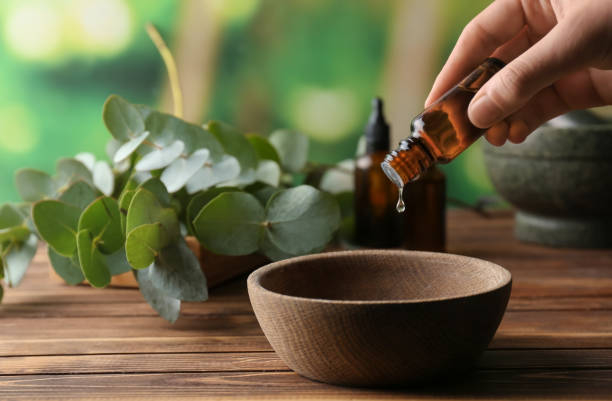
High in antioxidants 
High in antioxidants -
Eucalyptus is a frequent component in cold and cough treatments and is commonly used as a natural cold cure. It has been demonstrated in studies to reduce mucus and enlarge the bronchi and bronchioles of your lungs. It also has anti-inflammatory properties. Eucalyptol, also known as cineole, is a chemical present in eucalyptus oil that is responsible for these qualities. According to several studies, eucalyptol reduces cold symptoms such as cough frequency, nasal congestion, and headache by reducing inflammation and mucus accumulation. Additionally, eucalyptol may help alleviate asthma symptoms.
In one 12-week research, 32 patients with bronchial asthma were given 600 mg of eucalyptol or a placebo daily. The eucalyptol group needed 36% less medicine to treat their asthma symptoms than the control group, which needed 7% less. Inhaling eucalyptus oil via your nose may give some relief from cold symptoms. It's also in a lot of topical decongestants. However, because even little amounts of oil can be harmful, it should be avoided. Before using eucalyptol or altering your medicines, visit your healthcare practitioner.

May relieve cold symptoms 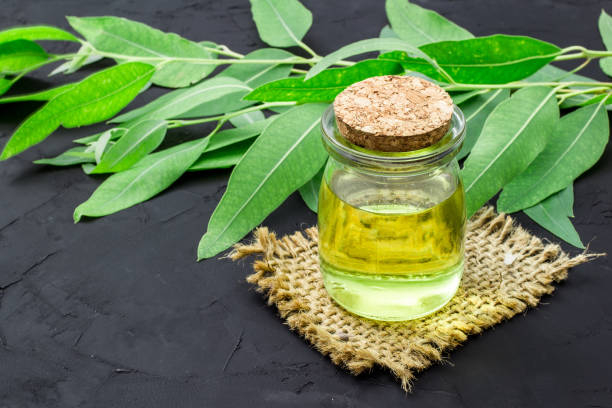
May relieve cold symptoms -
Eucalyptus can help dry skin by boosting its ceramide concentration. Ceramides are a kind of fatty acid found in your skin that is responsible for its barrier and moisture retention. Ceramide levels are often lower in those who have dry skin, dandruff, or skin illnesses such as dermatitis and psoriasis. Topical eucalyptus leaf extract has been shown to increase ceramide formation, hydration retention, and skin barrier protection. It includes macrocarpa A, a chemical that appears to increase ceramide synthesis.
A scalp lotion comprising eucalyptus leaf extract and synthetic ceramide dramatically reduced scalp redness, itching, dryness, and scaliness in 34-person research. As a result, the eucalyptus leaf extract is used in many hair and skin care products.

May treat dry skin 
May treat dry skin -
Inhaling eucalyptus essential oil may help to alleviate discomfort. Many anti-inflammatory chemicals, such as cineole and limonene, are found in eucalyptus and may work as pain relievers. A three-day study of 52 persons who had knee replacement surgery discovered that breathing eucalyptus oil dissolved in almond oil for 30 minutes every day significantly reduced reported pain and blood pressure levels when compared to inhaling pure almond oil.
Another study of 123 cancer patients revealed no reduction in felt pain after breathing eucalyptus oil for 3 minutes prior to medical treatment, indicating that additional research is needed.

May reduce pain 
May reduce pain -
Eucalyptus is commonly thought to alleviate stress symptoms. In one study, 62 healthy adults who inhaled eucalyptus oil saw significant decreases in pre-surgery anxiety. Eucalyptus contains eucalyptol, which has been shown to be anti-anxiety.
Furthermore, breathing eucalyptus oil for 30 minutes has been linked to reducing blood pressure in individuals recovering from knee surgery, suggesting that it has a relaxing impact. It is thought to reduce the activity of your sympathetic nervous system — your stress response system — while increasing the activity of your parasympathetic nervous system, which promotes relaxation.
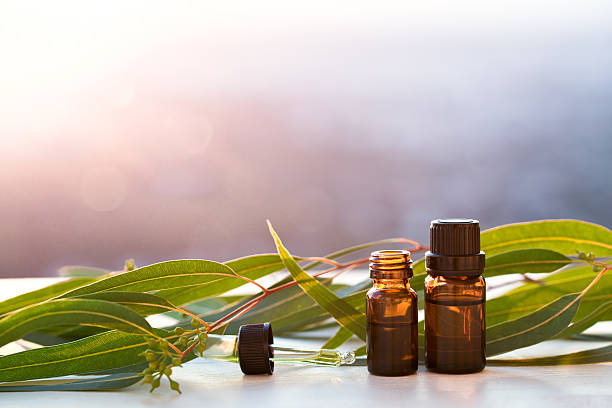
May promote relaxation 
May promote relaxation -
Eucalyptus leaf extract, often known as eucalyptol, has been shown to benefit tooth health. Eucalyptus leaves are rich in ethanol and macrocarpa C, a form of polyphenol. These substances are linked to decreased levels of bacteria, which can lead to cavities and gum disease.
A study of 97 persons revealed that chewing gum containing eucalyptus leaf extract 5 times per day for at least 5 minutes reduced plaque development, gum bleeding, and gum inflammation much more than the control group. As a result, eucalyptol is frequently included in mouthwash.
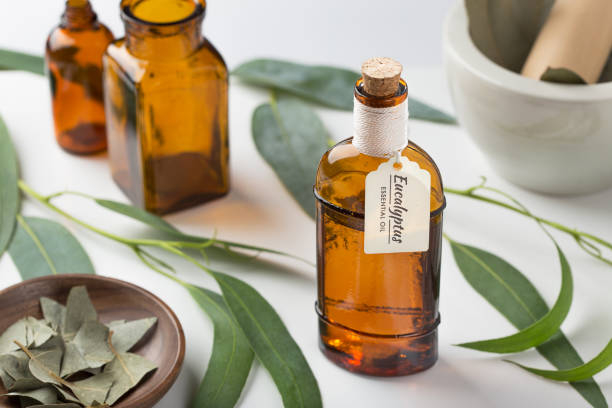
Can help keep your teeth healthy 
Can help keep your teeth healthy -
Because of its eucalyptol concentration, eucalyptus oil is a natural insect repellant. According to studies, it is efficient at repelling mosquitoes and other biting insects for up to eight hours after topical application. The more eucalyptol there is in eucalyptus oil, the longer and more efficiently it functions as a repellent.
In reality, the Centers for Disease Control and Prevention identifies lemon eucalyptus oil, which is produced from the lemon eucalyptus tree, as a safe and effective insect repellent. Eucalyptus oil may also be used to treat head lice. This oil was twice as effective as a common head lice treatment at curing head lice in one randomized research. A new assessment, however, recommends that further research is required.

Can act as a natural insect repellent 
Can act as a natural insect repellent




















